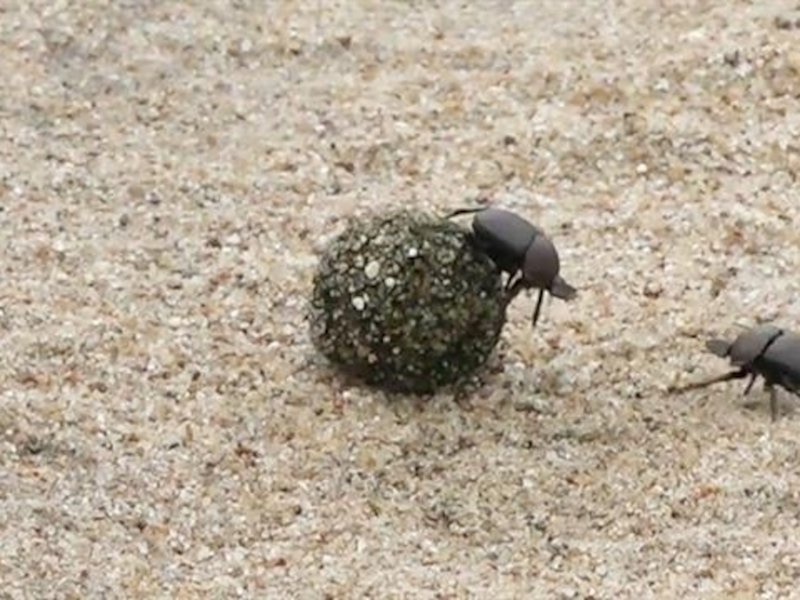
You might be wondering what makes dung beetles so special. Well, they’re not just your average bugs. They’ve got an impressive ability to transform dung into something useful, helping to enrich the soil and support plant growth. This unique role makes them an integral part of our ecosystems. Unfortunately, as temperatures rise and weather patterns change, these little beetles face challenges that could disrupt their important work. So, grab your coffee, and let’s explore the fascinating world of dung beetles and the impact that climate change has on them.
What Do Dung Beetles Do?
Dung beetles, as the name suggests, primarily feed on dung. They come in various shapes and sizes, often scuttling across fields or forests gathering animal waste. You might think it’s a bit gross, but this behavior is vital for several reasons. For one, dung beetles help to *decompose* waste, speeding up the process of nutrient recycling. This action supports soil health by increasing its organic content and improving its structure.
Moreover, by burying dung, these beetles aerate the soil, allowing essential nutrients to penetrate deeper into the ground. This not only benefits plants but also promotes a healthier ecosystem. Think of them as nature’s gardeners, ensuring that our landscapes thrive. Their activities also help reduce greenhouse gas emissions associated with waste decomposition, which is another significant win for our environment.
But what happens when these little helpers face challenges? As climate change progresses, their habitat and food sources are being threatened, which can lead to diminished populations and disrupted ecosystems.
The Effects of Rising Temperatures
As temperatures rise due to climate change, dung beetles are facing an uphill battle. Many species have specific thermal tolerances, meaning they thrive within a certain temperature range. When it gets too hot, their survival and reproduction rates can plummet. For instance, when dung beetles are exposed to high heat, they may become stressed, which affects their ability to find food and mate.
Research indicates that some species are now shifting their ranges to cooler areas, like moving higher up mountains or towards the poles. Here’s the thing: this migration can lead to overcrowding in suitable habitats, increasing competition for resources. If dung beetles can’t find enough food or space, their populations will inevitably decline, which could throw off the balance of the ecosystems they support.
Additionally, changing temperatures can also affect the timing of when dung is produced. If animal behavior shifts in response to warmth, it can create mismatches in the life cycles of dung beetles and their food sources, further complicating their survival.
Altered Precipitation Patterns
Rising temperatures aren’t the only challenge dung beetles are facing. Climate change also affects precipitation patterns, resulting in either too much rain or not enough. Dung beetles require moist environments to reproduce and thrive, so changes in rainfall can have serious implications.
Too much rain can lead to flooding, washing away the dung that these beetles rely on. It might sound odd, but beetles need dung not just for food, but also as a breeding ground. If it washes away, it can disrupt their life cycle. Think of it like a chef losing their main ingredient—without dung, there’s no reproduction, and without reproduction, beetle populations dwindle.
On the other hand, insufficient rainfall can lead to droughts, which can dry out the dung and make it less hospitable for beetles. In either case, the survival of dung beetles is threatened. Less beetle activity means fewer nutrients returned to the soil, leading to poorer plant growth and a less healthy ecosystem overall.
Habitat Loss and Fragmentation
With climate change driving habitat loss, dung beetles also face the challenge of fragmentation. Their habitats may become more isolated due to human activities like agriculture and urban development, making it hard for beetles to find mates and food. If you think about it, it’s like being dropped in a new city without a map—you’re lost and struggling to find your way.
Habitat fragmentation also affects the genetic diversity of dung beetle populations. Smaller, isolated groups are more vulnerable to extinction because they have fewer opportunities for genetic mixing. This loss of diversity can leave beetles less adaptable to changing environmental conditions, further jeopardizing their survival.
As their habitats shrink, dung beetles not only lose food sources but also find it harder to move to new areas as conditions change. This can lead to a vicious cycle of declining numbers and increasing vulnerability.
The Importance of Dung Beetles to Ecosystems
So, why does all this matter? Dung beetles play a critical role in maintaining the health of our ecosystems. They contribute to nutrient cycling, promote plant growth, and support a range of other wildlife. Without them, soil quality declines, which can affect food production and lead to a chain reaction impacting other species.
When dung beetles are thriving, they help reduce the spread of parasites and diseases found in animal waste. By breaking down dung, they minimize the chances of infectious agents leaching into water supplies. In short, they’re nature’s defense team, helping to keep ecosystems balanced and resilient.
As their populations decline due to climate change, we risk losing this balance. The repercussions could be profound, affecting everything from agriculture to biodiversity. Protecting dung beetles means safeguarding the entire ecosystem.
How Can We Help Dung Beetles?
Now that we understand the challenges dung beetles face, you might be wondering how we can help them out. Here are some practical steps we can take:
- Reduce Pollution: Cutting down on chemical fertilizers and pesticides can create a healthier environment for dung beetles.
- Support Conservation Efforts: Get involved in local conservation projects focused on preserving habitats rich in biodiversity.
- Promote Sustainable Farming: Practices that maintain healthy soil and ecosystems can benefit dung beetle populations.
- Raise Awareness: Educate others about the importance of dung beetles and the threats they face. Awareness can drive action.
Every small action can positively impact the communities these little beetles thrive in. You might not see these beetles every day, but they’re quietly working to keep our ecosystems healthy, and supporting them is essential for a balanced environment.
The impact of climate change on dung beetles is a pressing issue that often gets overshadowed by more visible environmental concerns. These small creatures are pivotal to the health of our ecosystems, acting as nature’s recyclers and soil enhancers. Climate change threatens their very existence through rising temperatures, altered rainfall patterns, and habitat loss, creating a domino effect that can disrupt the balance of nature.
By understanding their importance and supporting conservation efforts, we can help ensure that dung beetles continue their vital work for future generations. Every action counts, so let’s be mindful of how our choices affect these tiny but mighty insects. As we learn more about the connections between climate change and our ecosystems, let’s strive to protect not just dung beetles, but the entire web of life they support.

